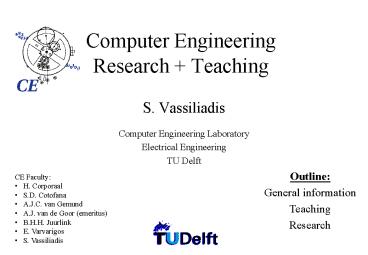Computer Engineering Research Teaching - PowerPoint PPT Presentation
1 / 17
Title:
Computer Engineering Research Teaching
Description:
CE = Computer Engineers. CS = Computer Scientists. SA = System Analysts. CP = Computer Programmers ... Analysis of Computer Systems. Current Contributions: ... – PowerPoint PPT presentation
Number of Views:66
Avg rating:3.0/5.0
Title: Computer Engineering Research Teaching
1
Computer EngineeringResearch Teaching
- S. Vassiliadis
- Computer Engineering Laboratory
- Electrical Engineering
- TU Delft
Outline General information Teaching Research
- CE Faculty
- H. Corporaal
- S.D. Cotofana
- A.J.C. van Gemund
- A.J. van de Goor (emeritus)
- B.H.H. Juurlink
- E. Varvarigos
- S. Vassiliadis
2
Computer Engineering Putting software and
hardware together to make computers.
3
EE Electrical Engineers CE Computer
Engineers CS Computer Scientists SA System
Analysts CP Computer Programmers
Banen
1.92 (SA)
1.90 (CE)
1.89 (CS)
1.20 (EE)
1.12 (CP)
1.000
4
Current Group Formation
7 Faculty Members
2 Post-docs
4 Scientific/ administrative staff
15 PhD Students
12 MSc Students
5
Scientific Results (94-98)
- Degrees
- PhD Theses................................ 9
- Eng. Degrees.............................. 5
- MSc............................................ 87
- Publications
- Books/Chapters.......................... 7
- Journal Papers............................ 47
- Conference Papers..................... 165
- Patents........................................ 50
- VSNU Evaluation (Research Quality Assessment)
- Scored 19 out of 20 points
- 1 of 4 excellent Electrical Engineering groups
- Committee comments
- One of the leaders in the academic world
- High relevance work
- Impressive industrial co-operation
- Productivity extremely high, particularly in
patents - Excellent viability
6
VSNU Evaluation
Excellent
18.5
17.5
15
12.5
10
7
Industrial Academic Impact
- 5 Start-ups
- Hardware
- IBM AS400 mod 400, 500, 501, 405, 505
- IBM Advanced 36
- IBM s/390 G4 G5
- Motorola/Apple/IBM PowerPC 603e, 604e
- Motorola/Apple/IBM 750
- MWAVE 3780i DSP
- Motorola Activec Multimedia
- Spase Nijmegen
- TNO-FEL MOVE
- Software
- UC Berkeley
- Un. of Amsterdam
- Un. of Utrecht
- TNO
- Indian Institute of Science
- Philips Research
- OCE
- NEC (Princeton Research)
- Expressed Interests
- HP
- GDM
- Nokia
8
Education
- Undergraduate Courses
- Logic Design
- Computer Programming
- Computer Architecture I
- Interpretation of Computer Programs
- Microprocessors
- Computer Architecture II
- Graduate Courses
- Computer Architecture III
- Logic Design II
- Performance Analysis
- Instruction Level Parallelism
- Embedded System Design
9
Research Projects
MOLEN Embedded system architecture,
multimedia, java. MOVE Embedded system
synthesis, compilers, hardware software
co-design. PAMELA Performance analysis and
languages. D-ILIAD Computer architecture,
implementation, computer arithmetic,
switches. NANOCOMP Single Electron Logic
10
Embedded Systems
- Facts
- Billions of embedded Systems sold anually
- Most embedded processor have special requirements
(Performance, Cost, Functionality, Power...) - Processing is heterogeneous
- Short design cycles for rapid requirement changes
- Conclusion
- Pay special attention to shifting paradigms
- Fast technology transfer to industry
- Our involvement
- 2 Projects (MOLEN, MOVE) for embedded systems
11
MOLENEmbedded System Design
- Topics
- Processor Embedded Architecture
- Multimedia
- Java
- Embedded System Tools
- Embedded Agents
- Current Contributions
- Java Processor
- Multimedia Instructions
- Specialized Units
- FPGA Units
- Future Directions
- Parametrical heterogeneous Embedded Systems
12
Minimal Multi-Agent Systems
- Can small independent systems work together to
reach global goals with only local knowledge? - How intelligent must the programs be for the
system to work as a single entity? - Must we impose some form of centralized control?
- Are patterns like cooperation, negotiation and
planning concepts that have to be pre-programmed?
? Embedded Agents
13
MOVE
Semi-automatic generation of application specific
processors
14
MOVE
- Current Contributions
- Transport triggered architecture
- Operational design framework (add any unit you
like, no restrictions) - Several cheap designs (data logger,
video-enhancher, MPEG-decoder, wireless
communications) - Future Directions
- Tune your application to suit your processor
- System design
- Multiprocessor TTA
- Low-power processors
15
PAMELAPerformance Analysis of Computer Systems
- Current Contributions
- Specialized Languages
- Simulation Tools Methodology
- Parallel Algorithms
- Delft Architecture Workbench
- Future Directions (immediate)
- Coplete the Delft Architecture Workbench
16
D-IliadHigh Performance General Purpose Computers
- Topics
- Uni Multiprocessors
- Internet Processing
- Computer Design
- High Speed Switches
- Current Contributions
- Instruction level parallel machines (Superscalar,
SCISM) - New Complex Instructions
- New Designs of Arithmetic Processing
- New Switch Design
- Future Directions
- New Architectural paradigm
17
NanoComp
Goal Investigating devices based on quantum
physics to break limits in speed and
miniaturisation.
- Speculative research
- Multi-disciplinary
- Quantum scale devices
- Motivation
- Scalability research of electronic devices
scalable down to atomic sizes. - Speed current semiconductor devices are
predicted to max out at clock speeds of ? 10
GHz.
- What do we do?
- Arithmetic operations (e.g., addition..) using
non-Boolean math and nano-devices
- Projections
- Experimental speed of 770 GigaHertz accomplished
with quantum flux devices. - Non-Volatile RAM modules of 256 Gigabytes and
more. - Feature size can shrink to less than 1 nm.
- Ultra low power consumption.































